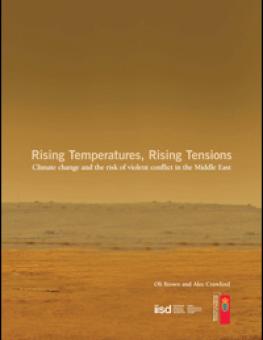
Rising Temperatures, Rising Tensions: Climate change and the risk of violent conflict in the Middle East
Climate models are predicting a hotter, drier and less predictable climate in the Middle East—a region already considered the world's most water-scarce and where, in many places, demand for water already outstrips supply. For Lebanon, Syria, Jordan, Israel and the occupied Palestinian territory, climate change threatens to reduce the availability of scarce water resources, increase food insecurity, hinder economic growth and lead to large-scale population movements. This could hold serious implications for peace in the region.
Rising Temperatures, Rising Tensions: Climate change and the risk of violent conflict in the Middle East is the latest IISD report on the links between climate change, peace and conflict. Drawn from extensive consultations and workshops throughout the region, augmented by desk research, the report makes three key points:
-
The legacy of conflict in the countries of the Levant undermines the ability of countries and communities in the region to adapt to climate change. The history of hostility and mistrust in the region greatly complicates efforts to collaborate over shared resources, to invest in more efficient water and energy use, to share new ways to adapt to climate change and to pursue truly multilateral action on climate change. Ultimately, climate change presents an even more serious challenge than it would otherwise.
-
The report shows that climate change itself poses real security concerns to the region. It may increase competition for scarce water resources, complicating peace agreements. It may intensify food insecurity, thereby raising the stakes for the return or retention of occupied land. It may hinder economic growth, worsening poverty and social instability. It could lead to destabilizing forced migration, increased tensions over refugee populations, the increased militarization of strategic natural resources and growing resentment and distrust of the West.
-
Nevertheless, the report points out there is much that national governments and authorities, civil society and the international community can do address the challenge of climate change, and in so doing, address some of the threats it may pose to regional peace and security. They can promote a culture of conservation in the region, help communities and countries adapt to the impacts of climate change, work to reduce greenhouse gas emissions and foster greater cooperation on their shared resources.
Participating experts
Additional downloads
You might also be interested in
Advancing Green Public Procurement in South Africa
This report analyzes practices and challenges of green public procurement in South Africa and provides recommendations for leveraging public spending to advance sustainability.
Advancing Gender-Responsive and Socially Inclusive Practices in Nature-Based Solutions for Adaptation
Get inspired by two nature-based solutions for climate adaptation projects that integrate gender equality and social inclusion considerations at various stages of implementation.
Sustainable Asset Valuation of Nature-Based Flood Mitigation Infrastructure in Drakenstein, South Africa
This report analyzes the social, economic, and environmental value of river restoration in Drakenstein Municipality.
Reforming Environmentally Harmful Subsidies
This playbook offers a strategic framework for philanthropic organizations to understand, engage, and advance environmentally harmful subsidies reform as a critical avenue for sustainable environmental and economic transformation.